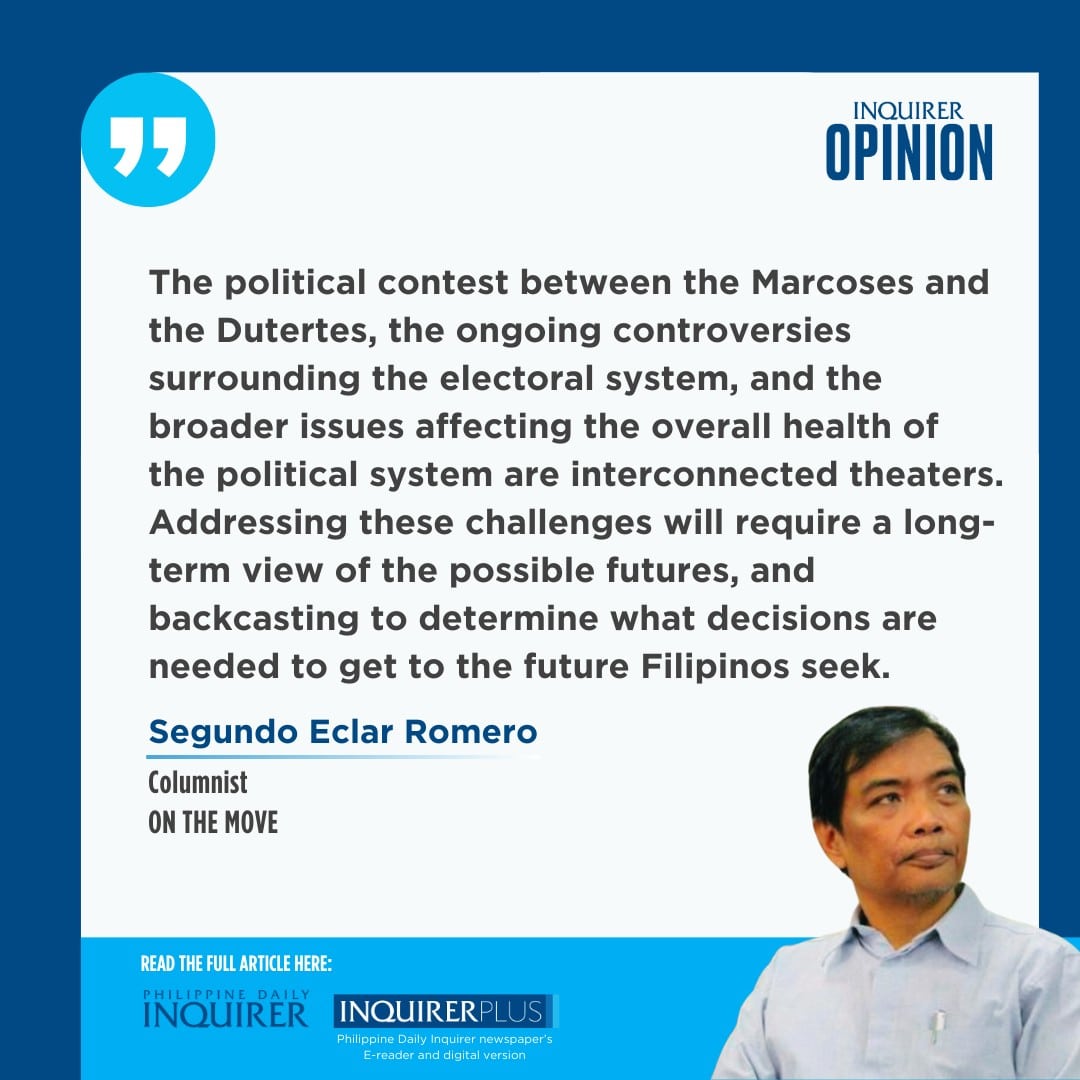Scenarios of the Philippine Future 2050
The country is now gearing up for the next political fiesta—the midterm and senatorial elections in May 2025. There is a sense of frustrating déjà vu, as we have seen this all before—the early actions of coalition-building by political parties focusing on persons but not ideals or goals, investigations in Congress to generate and control the narratives and optics that will register with the electorate in the run-up to the elections, the blow-by-blow daily political analysis in the social and mainstream mass media.
Is there a way to jolt the country toward a collective perspective of the alternative pathways to the future of the country? Well, here is an attempt to identify possible Philippine scenarios to widen and lengthen the field of vision of politicians and voters alike.
Strong republic scenario: This optimistic scenario envisions the Philippines achieving sustained high economic growth, reduced poverty and inequality, improved governance, and strengthened institutions. It involves successful diversification of the economy, investments in education and infrastructure, and effective implementation of anti-corruption measures. The drivers of this scenario are strong leadership, sound economic policies, technological advancements, favorable global conditions, and active citizen participation. The “strong republic” brand was used by President Gloria Macapagal Arroyo. Unfortunately, it was sullied by the Garci and ZTN controversies.
Business-as-usual scenario: This scenario projects a continuation of current trends, with moderate economic growth, persistent poverty and inequality, and ongoing challenges in governance and corruption. The drivers of this scenario are a lack of significant reforms, political gridlock, slow infrastructure development, and external shocks like natural disasters or global economic downturns. This BAU scenario was characterized by Paul Hutchcroft as the Philippines being “a changeless land.”
Fragmented archipelago scenario: This pessimistic scenario envisions the Philippines becoming increasingly fragmented due to social unrest, political instability, and widening regional disparities. It could involve a weakening of central authority, rising crime rates, and increased social polarization. The drivers of this scenario are worsening inequality, failure to address social grievances, political turmoil, and the inability to adapt to global challenges.
Tiger cub economy scenario: This scenario envisions the Philippines rapidly catching up with its more developed Asian neighbors, becoming a major economic power in the region. It involves leveraging its demographic dividend, investing in human capital, and fostering innovation and entrepreneurship. The drivers for this scenario are the successful implementation of structural reforms, massive investments in education and technology, and strong regional and global integration. This scenario is often premised on the country’s strong macroeconomic fundamentals, young and growing workforce, and potential for increased investment and trade.
Green archipelago scenario: This scenario sees the Philippines transitioning toward a sustainable and resilient economy, prioritizing environmental protection and climate action. It involves investing in renewable energy, promoting sustainable agriculture and tourism, and building resilient infrastructure. The drivers of this scenario are a strong commitment to environmental sustainability, effective policies and regulations, technological innovation, and international cooperation. The productive use and husbanding of the Philippine vast marine environment is integral to this scenario.
Digital leapfrog nation scenario: This scenario examines the potential of digital technologies to transform various sectors of the economy and society, driving innovation and inclusive growth. The Philippines successfully leverages digital technologies to modernize its governance, economy, and society. E-governance initiatives streamline public services and reduce corruption. Investments in digital infrastructure enable widespread internet access and digital literacy. The economy thrives with a flourishing tech sector and increased digital inclusion. The Philippines becomes a regional leader in digital innovation and enjoys sustainable growth. The drivers for this scenario are effective governance and high digital transformation.
China’s backyard scenario: This scenario refers to the geopolitical situation where the Philippines, due to various pressures and influences, increasingly falls within China’s sphere of influence, particularly in the context of the broader Asia-Pacific region. This scenario has empirical referents—countries so beholden to China politically and economically they are sovereign only in name. The drivers of this scenario are political subservience, economic dependence, and geopolitical and military domination.
The political contest between the Marcoses and the Dutertes, the ongoing controversies surrounding the electoral system, and the broader issues affecting the overall health of the political system are interconnected theaters. Addressing these challenges will require a long-term view of the possible futures, and backcasting to determine what decisions are needed to get to the future Filipinos seek.
—————
doyromero@gmail.com





















